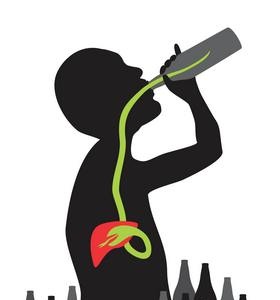|
 There are many reasons for the spread of alcoholism. The emergence and manifestations of alcoholism in each individual inevitably reflect the individual personality traits, the type of higher nervous activity, temperament, character, and the level of general culture. There are many reasons for the spread of alcoholism. The emergence and manifestations of alcoholism in each individual inevitably reflect the individual personality traits, the type of higher nervous activity, temperament, character, and the level of general culture.
All this is largely connected with upbringing, heredity also plays a large role here, but social circumstances occupy one of the first places among the causes of alcoholism. Lack of interest in their work, work for the end result, low political and social activity, especially among the poor, poor living conditions, scarcity of cultural interests, dissatisfaction with social status are the reasons for heavy drinking, which people often resort to as a means of oblivion.
Drunkenness and alcoholism - discussion on the forum
 At the same time, it should be borne in mind that the growth of well-being in itself does not at all solve the problem of alcoholism, which is confirmed by the example of many economically developed countries. The social system is capable of both creating an excuse and motives for taking alcohol, and limiting its use. Restriction can be formal (legislative) and informal (moral). The less opportunities a person has for overcoming difficult and unusual situations, the sooner a person resorts to alcohol and the less the likelihood of volitional influence directed against alcohol consumption. Drunkenness by imitation, "without a reason" spreads the sooner, the more tolerant people around him are. Young, mentally immature individuals (the so-called "drunkenness of the young") are most at risk of alcoholism. For them, drinking is a false indicator of maturity, independence and courage. Do not underestimate the development of alcoholism and the influence of the closest, immediate environment (parents, friends). At the same time, it should be borne in mind that the growth of well-being in itself does not at all solve the problem of alcoholism, which is confirmed by the example of many economically developed countries. The social system is capable of both creating an excuse and motives for taking alcohol, and limiting its use. Restriction can be formal (legislative) and informal (moral). The less opportunities a person has for overcoming difficult and unusual situations, the sooner a person resorts to alcohol and the less the likelihood of volitional influence directed against alcohol consumption. Drunkenness by imitation, "without a reason" spreads the sooner, the more tolerant people around him are. Young, mentally immature individuals (the so-called "drunkenness of the young") are most at risk of alcoholism. For them, drinking is a false indicator of maturity, independence and courage. Do not underestimate the development of alcoholism and the influence of the closest, immediate environment (parents, friends).
Everyone knows very well that vodka and other alcoholic beverages, when consumed excessively, turn into evil, turn into a destructive poison, with the use of which many human troubles are associated. The fight against drunkenness and alcoholism has been and remains in the future one of the most important tasks of modern civilized society.
Numerous medical, biological and sociological studies have reliably proven that alcoholism affects all aspects of individual and social life. Under the influence of alcohol, a person loses a sense of responsibility towards society and the state, commits offenses, damages production, and reduces labor productivity. Alcoholism leads to truancy and other violations of labor discipline, accidents and loss of life. The decline in morality and well-being of a significant part of the population is associated precisely with alcoholism.
Not only constant, but also episodic use of alcoholic beverages causes great harm to health, often leads to the destruction of families, and has a detrimental effect on the upbringing of children. According to WHO, alcoholism is the cause of one in three deaths from cardiovascular diseases, liver, stomach, kidney diseases, injuries, especially transport, and suicide. With a single intake of large doses of alcohol, acute alcohol intoxication can develop, often ending in death.
The effect of alcohol on the body is very complex and diverse. It is well studied.Under the influence of alcohol, irritation of the oral mucosa occurs, which spreads to the mucous membranes of the esophagus, stomach, intestines, irritation of the gastric mucosa causes increased secretion of its glands; the concentration of hydrochloric acid increases, but the digestive capacity of gastric juice decreases. A large amount of mucus is accumulating. All this disrupts the function of digestion. Alcohol abuse usually leads to depletion of the function of the glandular apparatus with the development of complete achilia (absence of hydrochloric acid and pepsin in gastric juice). Alcoholic gastritis is often accompanied by enterocolitis with the inevitable involvement of the pancreas and liver in the pathological process. Peptic ulcer of the stomach and duodenum is a common pathology of alcoholics.
 Absorption of alcohol, its entry into the bloodstream occurs quickly. It is excreted from the body. alcohol is extremely slow. The ability of alcohol to dissolve mainly in lipids, which are in large amounts in the cells of the brain and spinal cord, determines the frequency of lesions of the central nervous system in alcoholism. The psychic sphere is changing. The appearance, mental and physical state of an alcoholic, his degradation are quite figuratively described not only in special scientific, but also in fiction, and, unfortunately, there is no shortage of "visual aids" in practical life. Absorption of alcohol, its entry into the bloodstream occurs quickly. It is excreted from the body. alcohol is extremely slow. The ability of alcohol to dissolve mainly in lipids, which are in large amounts in the cells of the brain and spinal cord, determines the frequency of lesions of the central nervous system in alcoholism. The psychic sphere is changing. The appearance, mental and physical state of an alcoholic, his degradation are quite figuratively described not only in special scientific, but also in fiction, and, unfortunately, there is no shortage of "visual aids" in practical life.
Clinically, a person first develops the phenomena of asthenic syndrome with mood instability, increased suggestibility and irritability. There comes a lack of self-confidence, sexual weakness, sleep disorder, digestion, etc. Gradually psychopathic changes appear: character deteriorates, a person becomes egocentric, rude, gloomy, distrustful; sometimes heightened self-confidence, complacency, a tendency to monotonous flat (alcoholic) humor develop. Decrease in memory, attention, ability for synthetic thinking, artistic creativity is increasing. Working capacity drops sharply. After the stage of precursor phenomena (hangover, episodic hallucinations, fear, etc.), the patient develops delirious (insane) and convulsive syndromes or prolonged alcoholic psychoses. One of the hardest consequences of alcoholism is the development of a symptom complex of drug addiction, expressed in the appearance of a pathological craving for alcohol, loss of a sense of proportion and control over the amount of alcohol consumed (abstinence). Hangover syndrome is usually characterized by neuro-vegetative symptoms (tremors of the hands, the whole body, sweating, dry mouth, vestibular disorders). Often, alcoholics develop depressive and paranoid states, there are characteristic dreams that resemble white-hot disorders. In connection with the transferred alcoholic psychoses, a decrease in intelligence usually occurs, a pronounced state of dementia. The onset of a violation of the functioning of all organs and systems leads (in the absence of timely treatment) to irreversible degradation of the personality and death.
Dipsomania (binge) is a special alcoholic disease. Dipsomania is characterized by an acute, suddenly arising irresistible attraction to alcoholic intoxication. At the same time, a huge amount of alcoholic beverages is consumed, the appetite for ordinary food disappears. The binge usually lasts 3-7 days (sometimes 2-3 weeks), it also ends suddenly, and there is an aversion to alcohol. The intervals between hard drinking can be several months, sometimes years. A binge attack, as a rule, is preceded by the appearance of a bad mood, bouts of melancholy, apathy, etc. During a binge attack, the patient must be hospitalized.
Alcoholism is the cause of the exacerbation of many chronic diseases.The systematic use of alcoholic beverages leads to degeneration and fatty degeneration of the heart muscle, contributes to the development of chronic ischemic heart disease, myocardial infarction.
The defeat of the coronary vessels and cerebral vessels in alcohol abusers occurs 4-5 times, and the violation of vascular tone - 3-4 times more often than in non-drinkers. Hypertonic disease, atherosclerosis, myocardial infarction - a very common pathology in alcoholism. Severe forms of coronary sclerosis at a young age are observed mainly in alcoholics. Alcohol has a particularly harmful effect on the liver - its fatty degeneration occurs. The course of hepatitis is difficult, which ultimately contributes to the formation of cirrhosis (33% of patients with cirrhosis have a history of alcohol abuse). The pancreas suffers. Alcoholism is a common cause of pancreatitis, diabetes mellitus, jade. Partly secreted through the lungs, alcohol damages their elastic and reticular tissue, contributes to the development of emphysema, pneumosclerosis. These lesions, although not specific for alcoholics, are manifested in them 4 times more often than in non-drinkers.
 Alcohol has a toxic effect on the endocrine glands, and in particular on the genitals. A decrease in sexual function is observed in one third of alcohol abusers and in all chronic alcoholics. "Alcoholic impotence" is most severe in men, as a result of which they easily develop various functional disorders of the central nervous system (neuroses, reactive depression, etc.); in women, menstruation stops early, dystrophy of the ovarian germ cells is observed, a drop in fertility, toxicosis of pregnancy and complicated childbirth often occur. The genetic apparatus also suffers. Children conceived while intoxicated develop more slowly physically and mentally (later they begin to walk, talk, etc.), they often have various developmental defects, mental retardation, epilepsy, etc. The effect on offspring with alcoholism is especially pronounced. mother. The consumption of alcoholic beverages in youth is one of the reasons for moral decline, infection with sexually transmitted diseases. About half of the first abortions in unmarried women are the result of accidental relationships committed while intoxicated. 90% of infections with sexually transmitted diseases in both men and women occur in the same condition. Alcoholism dramatically reduces the body's resistance to the effects of various toxic substances. Against the background of alcoholism, various chronic diseases, especially infectious (tuberculosis, bronchiectasis, syphilis, etc.), bronchial asthma, rheumatism, cardiovascular diseases, 20% of household and 46% of street injuries are associated with alcoholism, from 11% to 18% % of industrial injuries, 70% of suicides are committed in a state of intoxication (8-10 times more often than non-drinkers). Alcohol has a toxic effect on the endocrine glands, and in particular on the genitals. A decrease in sexual function is observed in one third of alcohol abusers and in all chronic alcoholics. "Alcoholic impotence" is most severe in men, as a result of which they easily develop various functional disorders of the central nervous system (neuroses, reactive depression, etc.); in women, menstruation stops early, dystrophy of the ovarian germ cells is observed, a drop in fertility, toxicosis of pregnancy and complicated childbirth often occur. The genetic apparatus also suffers. Children conceived while intoxicated develop more slowly physically and mentally (later they begin to walk, talk, etc.), they often have various developmental defects, mental retardation, epilepsy, etc. The effect on offspring with alcoholism is especially pronounced. mother. The consumption of alcoholic beverages in youth is one of the reasons for moral decline, infection with sexually transmitted diseases. About half of the first abortions in unmarried women are the result of accidental relationships committed while intoxicated. 90% of infections with sexually transmitted diseases in both men and women occur in the same condition. Alcoholism dramatically reduces the body's resistance to the effects of various toxic substances. Against the background of alcoholism, various chronic diseases, especially infectious (tuberculosis, bronchiectasis, syphilis, etc.), bronchial asthma, rheumatism, cardiovascular diseases, 20% of household and 46% of street injuries are associated with alcoholism, from 11% to 18% % of industrial injuries, 70% of suicides are committed in a state of intoxication (8-10 times more often than non-drinkers).
Alcoholism and crime are closely related. Artificial agitation, a decrease in the critical moral assessment of the situation facilitates the commission of a criminal act. The systematic use of alcohol leads to premature old age, disability and death. According to WHO materials, the life expectancy of alcoholics is 15 years less than that of those who abstain from frequent alcohol consumption.
Chakhovsky A. I. Food culture
|
 There are many reasons for the spread of alcoholism. The emergence and manifestations of alcoholism in each individual inevitably reflect the individual personality traits, the type of higher nervous activity, temperament, character, and the level of general culture.
There are many reasons for the spread of alcoholism. The emergence and manifestations of alcoholism in each individual inevitably reflect the individual personality traits, the type of higher nervous activity, temperament, character, and the level of general culture. At the same time, it should be borne in mind that the growth of well-being in itself does not at all solve the problem of alcoholism, which is confirmed by the example of many economically developed countries. The social system is capable of both creating an excuse and motives for taking alcohol, and limiting its use. Restriction can be formal (legislative) and informal (moral). The less opportunities a person has for overcoming difficult and unusual situations, the sooner a person resorts to alcohol and the less the likelihood of volitional influence directed against alcohol consumption. Drunkenness by imitation, "without a reason" spreads the sooner, the more tolerant people around him are. Young, mentally immature individuals (the so-called "drunkenness of the young") are most at risk of alcoholism. For them, drinking is a false indicator of maturity, independence and courage. Do not underestimate the development of alcoholism and the influence of the closest, immediate environment (parents, friends).
At the same time, it should be borne in mind that the growth of well-being in itself does not at all solve the problem of alcoholism, which is confirmed by the example of many economically developed countries. The social system is capable of both creating an excuse and motives for taking alcohol, and limiting its use. Restriction can be formal (legislative) and informal (moral). The less opportunities a person has for overcoming difficult and unusual situations, the sooner a person resorts to alcohol and the less the likelihood of volitional influence directed against alcohol consumption. Drunkenness by imitation, "without a reason" spreads the sooner, the more tolerant people around him are. Young, mentally immature individuals (the so-called "drunkenness of the young") are most at risk of alcoholism. For them, drinking is a false indicator of maturity, independence and courage. Do not underestimate the development of alcoholism and the influence of the closest, immediate environment (parents, friends). Absorption of alcohol, its entry into the bloodstream occurs quickly. It is excreted from the body. alcohol is extremely slow. The ability of alcohol to dissolve mainly in lipids, which are in large amounts in the cells of the brain and spinal cord, determines the frequency of lesions of the central nervous system in alcoholism. The psychic sphere is changing. The appearance, mental and physical state of an alcoholic, his degradation are quite figuratively described not only in special scientific, but also in fiction, and, unfortunately, there is no shortage of "visual aids" in practical life.
Absorption of alcohol, its entry into the bloodstream occurs quickly. It is excreted from the body. alcohol is extremely slow. The ability of alcohol to dissolve mainly in lipids, which are in large amounts in the cells of the brain and spinal cord, determines the frequency of lesions of the central nervous system in alcoholism. The psychic sphere is changing. The appearance, mental and physical state of an alcoholic, his degradation are quite figuratively described not only in special scientific, but also in fiction, and, unfortunately, there is no shortage of "visual aids" in practical life.








